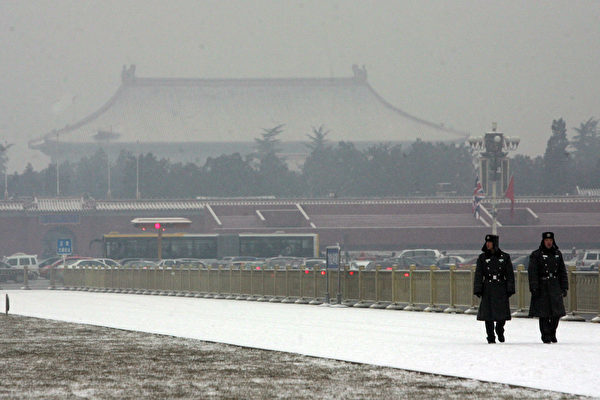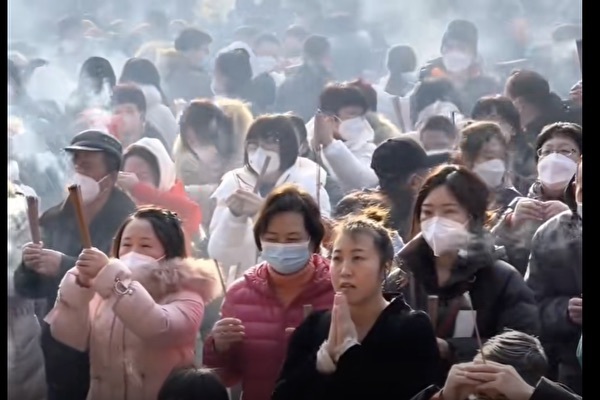In the early morning of October 6, 2024, Trump delivered his victory speech. (Photo by Chip Somodevilla/Getty Images)
[People News] Chinese netizens often describe the Chinese Communist Party (CCP)’s duplicity with a sharp saying: “When their neck is squeezed, they roll their eyes; when the grip loosens, they start boasting.” While this is intended to mock and criticize the CCP, it also reveals the regime’s cunning and deceitful nature.
With Trump about to take office, the CCP feels immense pressure. In the coming years, it is undeniable that the CCP will face blows, humiliation, and “neck-squeezing” in its competition with the U.S. Rolling its eyes in defiance is a common CCP trait. In the context of U.S.-China relations, major power interactions, and global geopolitics, the CCP’s visible strategic posture will likely include acts of submission, overtures of goodwill, and feigned reconciliation toward the West.
However, at its core, the CCP will not abandon or waver in its goals of “the East rising while the West declines,” undermining the U.S., infiltrating the West, strengthening its united front strategy, exporting its ideology, and advancing its global ambitions. The CCP’s wolf warrior diplomacy is likely to be toned down, shifting instead to a strategy of hidden aggression under a guise of friendliness—a hallmark of strategic deception.
On January 17, Trump and Xi Jinping had their first phone call. Xinhua News Agency's report on the conversation can be summarized in two phrases: hypocrisy and strategic deception.
Hypocrisy: Xinhua stated: "Xi Jinping congratulated Trump on being re-elected as President of the United States, noting that both sides attach great importance to their interactions," and that "we must respect each other's core interests and major concerns." It also mentioned, "China and the United States, two great nations, are both pursuing their respective dreams," and so on.
After Trump's election, it is true that both the U.S. and China placed significant importance on their interactions and that both nations are pursuing their respective dreams. However, Xi Jinping’s use of such rhetoric to obscure the reality of a new Cold War between the U.S. and China is a disingenuous attempt to curry favor and lull the other side into complacency. At the same time, it sends a signal to nationalist elements within China about a strategic shift in dealing with the U.S. Trump, in contrast, directly exposed the truth on his social media platform: “We discussed trade, fentanyl, TikTok, and other issues. I look forward to working together to solve many problems, starting immediately.”
Trump seeks to address the unfair trade practices by China and the problem of fentanyl, which the CCP continues to supply to the U.S., causing tens of thousands of American deaths each year. China’s fentanyl exports amount to waging an opium war against the U.S. Meanwhile, TikTok, which can be described as “digital fentanyl,” has poisoned millions of American teenagers.
Trump may delay a TikTok ban by 90 days after January 20. The author believes that this does not reflect Trump’s disregard for TikTok’s national security threat. Rather, it shows Trump’s confidence in finding a better way to resolve the TikTok issue—one that addresses security concerns, makes good use of TikTok’s existing business framework, and possibly even leverages the opportunity to uncover and dismantle the CCP’s methods of control, including but not limited to its algorithms.
Xinhua did not mention Trump’s comments, which is hardly an example of “respecting each other’s core interests and major concerns.” Moreover, Trump hopes to begin addressing these issues immediately. The Wall Street Journal recently revealed that Trump’s team had invited Xi Jinping to attend the presidential inauguration. Xi, however, was too timid to go. Trump’s team then expressed a desire to meet directly with Xi’s confidant, Cai Qi. This demonstrates Trump’s practical approach—going straight to the core and the main issue. But Xi dodged the request, sending Han Zheng, a member of the Politburo Standing Committee and China’s Vice President, to attend the inauguration instead. Superficially, this gave Trump face, but Han Zheng is not part of Xi’s inner circle, making him essentially useless in wielding actual influence.
The dreams of Trump and Xi Jinping are fundamentally at odds. Trump’s vision is for America to become great and strong again, ultimately leading to the dismantling of the CCP’s authoritarian regime. In contrast, Xi’s vision of a “community with a shared future for mankind” seeks to replace the U.S. as the global leader. Xi’s conciliatory tone masks an underlying mixture of helplessness, cunning, and deception.
Strategic Deception: On November 16, 2024, Xi Jinping met with former U.S. President Joe Biden in Lima, Peru. During the meeting, Xi drew four red lines: Taiwan, democracy and human rights, political systems, and development rights. He stated these were China’s red lines and could not be challenged by the U.S. Although nominally addressed to Biden, these remarks were in reality directed at Trump, who had already won the election. Xi subsequently tried to approach Trump’s team privately through Cui Tiankai, a former Chinese ambassador to the U.S., but these efforts failed. During the recent Trump-Xi phone call, Xi’s tone softened, and the four red lines were reduced to a single gray line. On the Taiwan issue, Xi merely stated, “The Taiwan issue concerns China’s national sovereignty and territorial integrity, and we hope the U.S. will handle it cautiously.”
At the same time, observers have noted that Xinhua has recently launched a campaign within China to promote “telling the story of U.S.-China relations,” praising U.S.-China friendship. They have also used incidents like TikTok “refugees” flocking to Xiaohongshu (a Chinese social media platform) to sing praises of people-to-people ties between the two nations. Meanwhile, China’s attitude toward Japan, a key U.S. ally in Asia, has visibly shifted from hostility to amiability.
On the surface, it appears that China is downgrading its red lines and opening the door to a “Nixon 2.0” moment with the U.S. However, in reality, Xi Jinping’s regime is engaging in strategic deception. According to revelations from Professor Yuan Hongbing on his YouTube channel “Yuan Hongbing Discusses the World” on January 18, Xi Jinping is currently deploying a new strategy for contesting the U.S.
According to disclosures by Yuan Hongbing, based on information from conscientious individuals within the CCP and second-generation elites who oppose Xi Jinping, the strategic points of Xi Jinping's dealings with Trump and his strategy toward the U.S. are as follows:
General Principle: Leverage "great struggles" to build strength and negotiate from a position of power. The core focus of negotiations with Trump is the CCP's ultimate priority: resolving the Taiwan issue in line with its own agenda.
During two internal meetings of the CCP Politburo and National Security Commission in December 2024, Xi specifically mentioned that during his face-to-face talks with Biden, he demanded that the U.S. go beyond merely stating its lack of support for Taiwan independence. Instead, he insisted the U.S. explicitly oppose Taiwan independence and express support for cross-strait unification. Xi proposed making similar demands to Trump, identifying this as the most critical aspect of CCP negotiations with him. Xi also expressed confidence that, should Trump publicly oppose Taiwan independence and support unification, it would destabilize Taiwanese society and public opinion, aiding the CCP in achieving military dominance to fulfill Ma Ying-jeou's prediction of a "decisive end in the first battle." Xi instructed all CCP institutions to align their strategies with this dual approach of competition and negotiation with Trump. The foreign ministry was tasked with privately communicating this core demand to Trump's team. If Trump fulfills this demand, Xi suggested the CCP could make significant concessions in other areas of negotiation, including potentially on the South China Sea issue with the U.S. and Japan.
Xi Jinping instructed Chen Yixin to escalate the campaign against Falun Gong overseas. It is reported that in late December, Chen implemented new measures targeting Falun Gong activities abroad. Chen called for intensified legal and media campaigns while also working to sever connections between Falun Gong-affiliated media and the U.S. Republican Party. The goal is to diminish the influence of Falun Gong media and Shen Yun Performing Arts on American society, focusing on the group's role in undermining U.S.-China agreements. Chen Yixin also emphasized that efforts in 2025 should target Falun Gong in the U.S. and Taiwan. He views Falun Gong as a significant obstacle to the CCP's unification and negotiation strategies. Efforts are to concentrate on media leaders, key personnel, and influential figures in Taiwan. The CCP has compiled a list of 52 Taiwanese Falun Gong practitioners for targeted actions, including retired National Taiwan University professor Ming Juzheng.
Song Tao, head of the Taiwan Affairs Office, outlined efforts to propagate skepticism toward the U.S. in Taiwan, embedding the notion of "America's unreliability" into public perception. He also emphasized preventing the dissolution of the Taiwan People's Party (TPP) following Ko Wen-je's departure, mobilizing groups like the pro-unification party and figures influenced by Ma Ying-jeou to bolster the TPP. The aim is to position the TPP, under Huang Kuo-chang's leadership, as a new force advocating reunification and opposing independence. Song also called for strengthening and expanding the "blue-white coalition" in Taiwan's Legislative Yuan, ensuring it dominates and influences U.S. and Japanese concerns over Taiwan's political stability. This aligns with Xi Jinping's strategy of leveraging Trump for negotiations.
At the end of December 2024, Zhang Youxia convened a combat training meeting for military officers from the Eastern and Southern Theater Commands. Zhang emphasized that the CCP's army must remain "as still as a mountain and as swift as a rabbit." He stated that any major social unrest in Taiwan would signal immediate combat readiness. He predicted heightened political tensions in Taiwan around the 2026 local elections, identifying any unrest before this period as a pretext for military action.
According to Yuan Hongbing's revelations, Xi Jinping, as previously reported by The Wall Street Journal, continues to harbor illusions about the "rise of the East and decline of the West." He views Trump's transactional nature as an opportunity to advance the CCP's covert strategic goals, prioritizing Taiwan unification during Trump's tenure. Xi regards efforts to suppress Falun Gong in the U.S. and Taiwan as critical obstacles to be eliminated. Simultaneously, the CCP is leveraging various forms of influence and infiltration in both countries to disrupt Falun Gong and destabilize Taiwan's political ecosystem.
This is Xi Jinping and the CCP's calculated strategy. However, human plans often fail to account for unforeseen factors. If Trump's second term mirrors Reagan's second term, the world may finally face a decisive confrontation over whether to tolerate the CCP's existence. Let us watch and see how events unfold. △
(First published in People News)











News magazine bootstrap themes!
I like this themes, fast loading and look profesional
Thank you Carlos!
You're welcome!
Please support me with give positive rating!
Yes Sure!